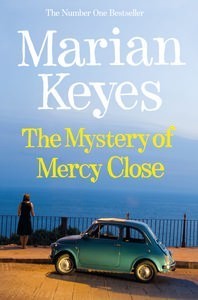 Since I read everything Marian Keyes publishes, it was only a matter of time before I got around to The Mystery of Mercy Close (when I’ll get around to blogging about This Charming Man – Excellent! – and The Brightest Star in the Sky – Charming. – is another question entirely). As it is when the book circle met before the summer and everyone presented their suggestions for summer reading, two of us had Keyes in our pile (though my pile was virtual, I was badly prepared). And so it ended up on our combined list almost by default.
Since I read everything Marian Keyes publishes, it was only a matter of time before I got around to The Mystery of Mercy Close (when I’ll get around to blogging about This Charming Man – Excellent! – and The Brightest Star in the Sky – Charming. – is another question entirely). As it is when the book circle met before the summer and everyone presented their suggestions for summer reading, two of us had Keyes in our pile (though my pile was virtual, I was badly prepared). And so it ended up on our combined list almost by default.
Things were looking grim, though, until I got out of the funk, fiction was not pleasing me at all. However, I got out somehow and finished The Mystery of Mercy Close, well, not in record time, but certainly quite quickly.
In other words, it’s highly readable. My friend Linda said she had a hard time getting into it because she’s stuck on the other Walsh sisters’ depictions of Helen, but my memory is bad. I mean, really, really bad. It leaks like a sieve. This is one of the reasons I reread, after all. Anyway, I remember Helen being mentioned, obviously, but that’s it. So I found her rather intriguing from the start. She doesn’t «belive in love, fear, depression or hot drinks». She is sour, misantropic and sarcastic.
I have a habit of taking instant dislikes to people. Simply because it saves time.
(Page 72.) She is also distinctly weird, and you can see how she would rub her sisters quite the wrong way, in fact she would rub most people the wrong way. Life in a presumably regular-sized Irish (lower?) middle-class house with 6 other people (parents and four sisters) must have been hellish for someone like Helen.
The fact is that the human race has survived for a very long time (way too long, in my opinion; they can bring on the Rapture anytime they like)
(Page 184.) Anyway, I like her. She’s prickly, but I can feel quite prickly myself on occasion. It will be interesting at some point in the future to reread the other Walsh sisters’ books and see how Helen is actually viewed by them. I must remember to take notes or something, though. (Memory. Leaks. Sieve.)
The Mystery of Mercy Close is partly a classic mystery, Helen is, after all, a private investigator and partly a love story, but it is also very much a book about depression. And it’s the latter that demonstrates, yet again, how Keyes at her best manages to describe the indescribable. Actually, this is not Keyes at her absolute best (Rachel’s Holiday is probably her masterpiece and I also really like This Charming Man), she fails to make me feel what Helen is feeling and there are times I would like to shout «Oh, snap out of it!» even though I know perfectly well that would be quite pointless. What Keyes does manage to convey, though, is the variety of utterly unhelpful reactions someone with depression may expect to encounter in their family and friends (one of which, incidentally, is the «Oh, snap out of it!» thing).
Additionally, the mystery part is compelling, why HAS Wayne Diffney disappeared? The descriptions of boybands, their stereotypes and more especially of the desparate measures old and decrepit boybands might take, are hilarious, as are the scarily accurate analyses of how the originally uninterested general public reacts with the right sort of PR.
As for the love story, the publishers have done the book a disservice by presenting it as some sort of love triangle struggle in their synopsis on the back of my copy, anyway:
When a missing-persons case draws her into the dark, glamorous world of her dodgy ex, Jay Parker, Helen finds she’s seeing more of him and less of Artie Devlin, her sexy detective boyfriend. Caught between smart, stable Artie and chaotic, up-for-anything Jay – two different, equally enticing men – and plagued by her own black doubts, Helen finds she’s beginning to believe in something. But is it fear or is it love?
Sure, there is baggage with Jay and sure, he’s moving in somewhat glamorous circles right now (hardly that glamorous, though, mostly washed-up ex-b-list celebs) and dark? Hardly. And the caught between two men, thing, as a plot? I’m so over it. I was put off by this description and had it been an author I liked less it might have prevented me reading the book. As it is, and I apologize if this is a major spoiler for you (stop reading NOW if you’re intrigued by the love triangle!) Helen is never even close to considering getting together with Jay again. The story with Artie is interesting, however, though it plays a fairly minor role in the grand scheme of things.
In conclusion: Not Keyes’ best (but far from her worst). Definitely worth reading, though.
Incidentally, for the best description of what depression feels like that I have ever read (take into account that I have never experienced clinical depression and therefore cannot judge its accuracy from the inside, so to say, just it’s usefulness in understanding my fellow humans’ behavior) can be found in Allie Brosh’s Hyperbole and a Half.